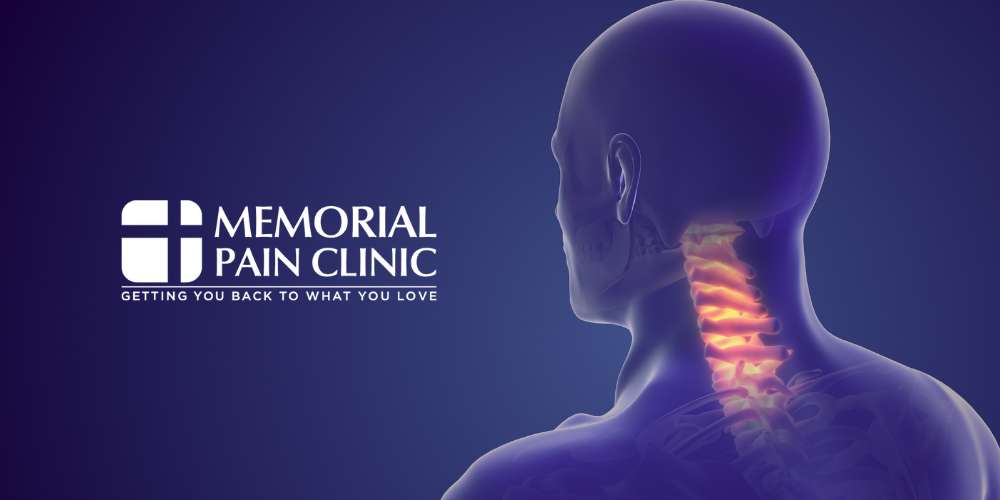Neck Pain Treatment Tulsa, OK
Our Services

Achieve Neck Pain Relief in Tulsa, OK with Memorial Pain Clinic
Experiencing neck pain can significantly disrupt your daily life. At Memorial Pain Clinic in Tulsa, OK, we’re dedicated to providing effective, personalized neck pain treatment to help you find relief. Our experienced team specializes in diagnosing and managing neck pain, utilizing the latest techniques and therapies to address both acute and chronic conditions.
Whether your discomfort stems from injury, strain, or an underlying medical issue, we are committed to offering comprehensive care tailored to your unique needs. We will help you relieve pain, regain mobility, and improve your quality of life. Explore our innovative approaches to neck pain treatment and take the first step toward a pain-free life with Memorial Pain Clinic.
To schedule an appointment with us, please call our office at 918-200-9944 today.
Neck Pain Symptoms
Depending on the underlying cause of the neck pain, common associated symptoms include the following.
- Neck stiffness or limited range of motion
- Sharp or stabbing pain
- Soreness
- Radiating pain
- Headaches
- Spasms of the neck muscles
- Numbness or tingling
- Weakness in the shoulders, arms, or hands
- Swelling and inflammation
- Difficulty swallowing or breathing
Types of Neck Pain

Neck Pain: Left Side
Usually, left side neck pain comes from sleeping in an awkward position, which causes muscle strain. Other potentially serious causes include tumors or rheumatoid arthritis.
Neck Pain: Right Side
Neck pain on the right side has various causes, including age-related degeneration, poor sleeping positions, brachial plexus injuries, cervical radiculopathy, and much more.
Front Neck Pain
Front neck pain can be more concerning, as it may involve structures like the thyroid gland, throat, or esophagus. This type of pain might be linked to infections, inflammation, or even referred pain from heart conditions.
Back of Neck Pain
Back of neck pain is commonly associated with tension and stress, leading to muscle tightness and discomfort. This type of pain often results from poor posture, prolonged computer use, or sleeping in an awkward position. Conditions like cervical spondylosis, which involves wear and tear of the spinal disks, can also cause persistent neck pain in the back.
Cervical Neck Pain
Cervical neck pain specifically refers to discomfort in the cervical spine area. It can range from mild to severe pain and might involve symptoms like stiffness, headaches, and reduced mobility. This type of pain is often due to degenerative changes, injuries, or conditions such as herniated discs.
Neck and Shoulder Pain
Neck and shoulder pain is a common combination, often resulting from issues like poor ergonomics, heavy lifting, muscle strain, or repetitive motions that strain both the neck and shoulder muscles. Conditions like rotator cuff injuries or impingement syndrome can also cause pain that radiates between the neck and shoulder.
Neck Pain from Sleeping
Neck pain from sleeping usually occurs due to poor sleeping posture or an unsupportive pillow, leading to muscle strain and discomfort upon waking. Ensuring proper neck alignment and using a supportive pillow can often alleviate this type of pain and prevent a stiff neck.
Neck Pain After Car Accident
Neck pain after a car accident is frequently associated with whiplash, a condition where the neck is suddenly and forcefully jerked forward and backward. This neck injury can cause damage to the soft tissues, leading to pain, stiffness, muscle pain, and sometimes chronic issues if not properly treated.
How Is Neck Pain Diagnosed?
Diagnosing neck pain involves a comprehensive approach that combines a detailed medical history, physical examination, and various diagnostic tests to pinpoint the underlying cause. These tests help us differentiate between a simple pinched nerve and more serious conditions. We usually do the following in order to diagnose a patient.
- Take a detailed medical history
- Performing a physical exam
- Ordering imaging tests, such as x-rays, MRIs, CT scans, and ultrasounds
- Nerve conduction studies and electromyography
- Blood tests
Common Neck Pain Causes

Neck pain can be caused by a variety of factors, ranging from lifestyle habits to underlying medical conditions. Poor posture, injury, and certain conditions, such as the following, are among the most common causes of neck pain.
Neck Arthritis
A common cause of neck pain, arthritis of the joints in the vertebrae (facet joints) usually develops as we age. The vertebral bones slowly degenerate over time and can pinch nerves or other supportive tissue to cause inflammation. Depending on the amount of degeneration and the location of arthritis, you may experience pain in your neck, upper back, shoulders, as well as radicular symptoms in the arms.
TMJ Neck Pain
Temporomandibular joint (TMJ) disorders can be closely related to neck pain due to the interconnectedness of the jaw and neck muscles and structures. TMJ can cause muscle tension in the jaw and neck, potentially leading to muscle spasms and pain. Postural changes, referred pain, and dysfunction of the TMJ can all contribute to neck pain.
Degenerative Disc Disease
The cartilaginous discs between our vertebral bones degenerate as we age, resulting in a loss of disc space between the vertebrae. Spinal stability may decrease and the vertebrae react by increasing bone growth (called bone spurs). These growths may put pressure on the spinal roots causing inflammation, or the spinal cord to cause pain. Several treatments are available, depending on the location and amount of degeneration.
Fibromyalgia
Common syndrome where the person has whole body pain with “tender points” of pain in the joints, muscles, tendons, and other soft tissues. The cause of Fibromyalgia is unknown, but often mimics other chronic pain problems. Triggers for Fibromyalgia may include emotional or physical trauma, infections, activity, weather, anxiety, or stress.
Vertebral Fractures
Stress fractures as a result of trauma or osteoarthritis of the vertebrae may lead to vertebral fractures. Symptoms of fractures vary greatly on the severity and location of the fracture but may include: achy and dull sensation, muscle weakness or spasms, numbness/tingling, or paralysis in severe cases.
Whiplash
Rapid back and forth motion of the head (often occurs in car accidents) may cause neck pain radiating to nearby tissues. The hyperextension strains ligaments and muscles and may affect the vertebral discs as well. Severe cases of whiplash can even impact the brain and spinal cord. Symptoms usually improve with conservative treatment.
If you suffered this car accident injury in Tulsa, contact Memorial Pain to learn more about treatment options.
Can Neck Pain Be a Sign of Something Serious?

Yes, neck pain can sometimes be a sign of a serious underlying condition, and it is important to recognize when it may indicate a more severe health issue. It is not always possible to prevent neck pain, but you can take steps to reduce the likelihood of developing neck pain. While most neck pain results from benign causes such as muscle strain, poor posture, or minor injuries, there are instances where neck pain requires prompt medical attention.
Some serious conditions that neck pain can indicate include meningitis, cervical spine conditions, heart-related issues, cancer, spinal cord issues, and rheumatoid arthritis.
While neck pain is often due to non-serious causes, it can occasionally indicate a more serious condition. It’s important to be aware of your symptoms and seek medical evaluation when necessary. This helps ensure timely diagnosis and treatment, as well as prevention of complications.
Neck Pain Treatments in Tulsa, OK

Neck pain treatments encompass a variety of approaches tailored to address the specific cause and severity of the pain. The goal is to alleviate discomfort, improve function, and prevent recurrence. Common treatment options to relieve neck pain include medications, transcutaneous electrical nerve stimulation (TENS), injections, and physical therapy, each playing a critical role in managing neck pain effectively.
Medications for Neck Pain Relief
Medications are often the first line of treatment for neck pain relief, aiming to reduce inflammation, alleviate pain, and relax muscle tension. Over-the-counter pain relievers such as ibuprofen and acetaminophen can be effective for mild to moderate pain.
For more severe pain, doctors may prescribe stronger medications, such as muscle relaxants to ease muscle spasms and stiff neck muscles or prescription-strength NSAIDs to reduce inflammation. In some cases, short-term use of opioids may be considered for acute, intense pain, though this approach is typically reserved for severe cases due to the risk of dependency.
What Is the Best Painkiller for Neck Pain?
The best painkiller for neck pain depends on the severity and underlying cause of the pain, but commonly used options include over-the-counter medications like ibuprofen and acetaminophen. Ibuprofen is particularly effective for reducing inflammation and pain, making it ideal for conditions like muscle strain or tension. For those who cannot take NSAIDs due to stomach or kidney issues, acetaminophen is a good alternative for pain relief without anti-inflammatory effects.
In cases of severe pain, prescription medications such as muscle relaxants or stronger NSAIDs may be necessary, and in some instances, corticosteroid injections can provide significant relief by targeting inflammation directly. Consulting a healthcare professional is essential to determine the most appropriate pain management strategy based on individual needs and medical history.
Injections for Neck Pain Relief
Injections can provide significant relief for patients with chronic or severe neck pain that does not respond to oral medications. Corticosteroid injections are commonly used to reduce inflammation and pain in the affected area. These injections can be administered directly into the facet joints of the cervical spine or the epidural space surrounding the spinal cord.
Another type of injection, nerve blocks, can help diagnose and treat neck pain by temporarily numbing specific nerves suspected of causing nerve pain. While the relief from injections can be temporary, they can provide a crucial window for patients to engage in other therapies, such as physical therapy. To learn more about injections and nerve blocks in Tulsa, contact Memorial Pain for a consultation.
Physical Therapy for Neck Pain Relief
Physical therapy is a cornerstone of neck pain treatment, focusing on restoring mobility, strength, and function while preventing future pain episodes. A physical therapist will develop a personalized exercise and stretching program aimed at improving posture, strengthening the neck and upper back muscles, and enhancing flexibility.
Techniques such as manual therapy, where the therapist uses hands-on techniques to mobilize the neck joints and soft tissues, can also be highly effective. Additionally, physical therapists often incorporate modalities such as heat, ice, ultrasound, and electrical stimulation to reduce pain and inflammation.
Some patients worry that physical therapy might make their neck pain worse. However, working with a skilled physical therapist can help you reduce pain and restore movement. By showing you how to properly perform certain neck pain exercises, you can continue those exercises at home as needed.
Contact a Neck Pain Doctor in Tulsa, OK at Memorial Pain Clinic
At Memorial Pain Clinic in Tulsa, OK, we understand the debilitating impact that neck pain can have on your daily life. Our dedicated team of pain management specialists is committed to providing compassionate and comprehensive care tailored to your unique needs. Whether you’re seeking relief from acute injuries, chronic conditions, or persistent discomfort, we offer a range of cutting-edge treatments, including medications, injections, and interventional procedures.
With our patient-centered approach and emphasis on evidence-based practices, we strive to alleviate neck pain and improve overall quality of life. Take the first step toward a pain-free future by scheduling a consultation with Memorial Pain Clinic today. Your journey to lasting relief starts here.

